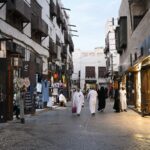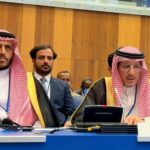A recent national report has called for making marriage loan beneficiaries complete a pre-marriage training course. In a particularly bold move, it proposed requiring parents considering divorce to pass a specialized course in “healthy separation and shared parenting” as a prerequisite for completing documentation procedures. This is part of a package of practical, zero-cost recommendations aimed at enhancing the stability of Saudi families.
These qualitative proposals were included in the latest publication titled “The Next Generation of Saudis: Childhood in the Kingdom,” which provides scientific reference for decision-makers with the goal of enabling 8 million children to experience a safe childhood that prepares them to become globally competitive citizens, in alignment with the Kingdom’s Vision 2030.
The recommendations included expanding the scope of the “Qurra” program supporting child hospitality to include both parents, launching the “Mawaa’ama” certificate for family-friendly work environments, intensifying exploratory health screening in early childhood centers, and encouraging vital specializations such as adolescent medicine, lactation consultants, and child life specialists.
These proposed solutions were based on results from in-depth field research that examined 10 major risks facing the next generation, including weak parenting skills, the impact of parental separation, childhood obesity, bullying, digital addiction, neglect of traffic safety, the danger of e-cigarettes, childhood obesity, and others.
Conversely, the report documented 8 positive experiences children in the Kingdom enjoy, including sports, hobbies, family communication, play, and volunteering. These findings and recommendations were reached based on a combined “quantitative and qualitative” research methodology that included direct interviews with children themselves, their parents, and those who work with them across 18 cities and governorates throughout the Kingdom, giving the report significant depth and credibility.
The Next Generation of Saudis: Childhood in the Kingdom
This is not a physical place or cultural site, but rather a concept or theme describing the modern upbringing and experiences of children in contemporary Saudi Arabia. It reflects the societal shifts and new opportunities emerging from the country’s Vision 2030 reforms, which are shaping a generation with greater global connectivity and different aspirations than their predecessors. This “next generation” is growing up in a rapidly evolving social and economic landscape.
Kingdom’s Vision 2030
“Kingdom’s Vision 2030” is not a physical place but a strategic framework and blueprint for Saudi Arabia’s future development. Launched in 2016 by Crown Prince Mohammed bin Salman, its history is rooted in the need to diversify the nation’s economy away from oil dependency. The vision outlines ambitious goals across economic, social, and cultural sectors to transform the country by the year 2030.
Qurra program
The Qurra program is a cultural initiative launched by the UAE’s Ministry of Culture and Youth to train and certify professional Arabic language storytellers. Its history is rooted in a 2021 pilot project designed to revive the ancient Arab tradition of oral storytelling (Hakawati) and promote reading among children and families. The program aims to preserve this intangible cultural heritage by equipping a new generation with the skills to share stories in engaging ways.
Mawaa’ama certificate
I am unable to find any historical or cultural information on a place or site called “Mawaa’ama certificate.” It is possible that the name may be misspelled or refers to a very localized or obscure term. If you have more context or can verify the spelling, I would be happy to try again.
Saudi families
“Saudi families” refers to the traditional family structure and social values in Saudi Arabia, which are deeply rooted in tribal heritage and Islamic principles. Historically, these families were often part of nomadic Bedouin tribes or settled communities, with strong emphasis on extended kinship, honor, and communal responsibility. Today, while modernization has introduced changes, many Saudi families continue to prioritize close-knit relationships, parental authority, and religious traditions.
Kingdom
A “kingdom” refers to a sovereign territory or political entity ruled by a monarch, such as a king or queen. Historically, kingdoms were the dominant form of government across the world, from ancient realms like Egypt and Mesopotamia to medieval European powers like France and England. While many have evolved into constitutional monarchies or republics, the cultural and historical legacy of kingdoms continues to shape national identities and heritage sites like castles, palaces, and ancient capitals.






